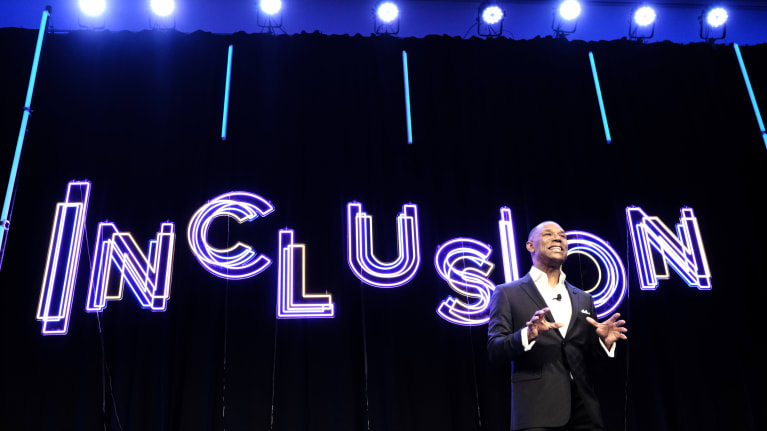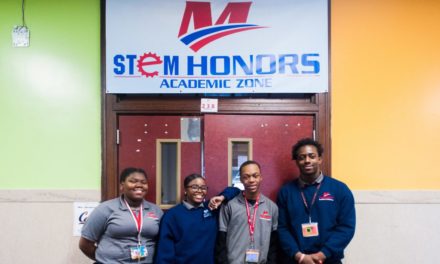
By Kathy Gurchiek October 29, 2019
NEW ORLEANS—How often do your values and beliefs affect your attitude about others? When is the last time you openly disagreed with someone at work? How do you respond to conflicts over politics at work?
Those were some of the tough questions Johnny C. Taylor, Jr., SHRM-SCP, president and chief executive officer of the Society for Human Resource Management (SHRM), posed Monday to attendees at the opening session of SHRM’s Inclusion 2019 event.
SHRM simplified the annual conference’s name from Diversity & Inclusion Conference & Exposition to emphasize the need for inclusion in the workplace.
“Diversity—just diversity—doesn’t work. You can hire the most multicultural, multigenerational workforce imaginable. But left alone, their differences are going to cause more problems than they solve. So, we are leading with inclusion at this conference,” Taylor said.
While inclusion means being invited to the “right” meetings at work, feeling part of the team, and having a pathway to growth and access to tools and opportunities, it’s also making sure people are not being sidelined at work simply because of their looks or beliefs.
Refusing to work with people because of differences in personal or political leanings goes against the concept of inclusion, Taylor told HR professionals at the event. It cuts us off from different points of view and limits our effectiveness.
Some SHRM members, for example, have criticized SHRM for its public-policy work, such as its involvement in a White House jobs initiative or Taylor’s acceptance of a White House board appointment, because they opposed SHRM’s working with a political figure or administration that doesn’t line up with their own ideals.
SHRM is about policy, not politics; sitting on the sidelines while others who lack expertise try to shape workplace policy is unadvisable, Taylor said. “Here’s our opportunity to be in the room” to effect change on issues like pay equity, the skills gap and overburdensome policies, “and we cannot turn a blind eye to that invitation.”
Similarly, SHRM was criticized in some quarters for naming NFL quarterback Drew Brees as a keynote speaker at the conference. The 2009 Super Bowl champion will talk about his experience of leading a multigenerational team. Some thought Brees was a poor choice because he appeared in a video promoting Take Your Bible to School Day for a Christian group that holds anti-LGBTQ views. Brees has said that he was unaware of the group’s stance toward the LGBTQ (lesbian, gay, bisexual, transgender and queer) community and that it is a view he doesn’t share.
The controversy illustrates the importance of having inclusive workplaces that encourage authentic dialogue about diversity, inclusion, acceptance and belonging, Taylor said. Nearly half of U.S. workers (42 percent) have said they have experienced political disagreements in the workplace.
“Excluding someone—or ourselves—because some people’s views or experiences are different from our own goes against the very focus of this gathering.”
Hard Truths
Taylor touted five truths about inclusion that he sees as fundamental and powerful for the workplace:
1. Provide the presence of respect.
Demonstrate through your actions that co-workers deserve respect, he said, because toxicity enters when respect is absent. He pointed to SHRM’s new report, The High Cost of a Toxic Workplace Culture, which found that such toxicity is a primary reason workers quit their jobs and that they often hold the managers in their workplaces responsible for creating such an environment.
2. Value strengths.
Taylor noted new SHRM Foundation research that found there are many HR professionals who don’t understand the capabilities of people with disabilities.
3. Cultivate inclusive managers.
People managers propagate an organization’s culture, Taylor said, and leaders must encourage them to be deliberate in identifying and recognizing the unique strengths of people on their teams.
4. Aspire to an intentional, resilient culture.
“Inclusive cultures aren’t static,” Taylor said. “All it takes is the addition of one toxic leader, reduction in force or public-relations crisis to change everything. So be intentional about creating a resilient culture of inclusion that is built to last through transition.”
While Taylor urged attendees to create a culture that can withstand transitions, he noted that he was not saying everyone should be included all the time.
“When you take the time to create a workplace culture that fits—fits your organizational values, your business priorities, your customer base, your local environment and your future plans—not everyone is going to belong in it.”
5. Evaluate your own biases.
“When we ask employees to bring their authentic selves to work, do we mean it?” he asked. “What if they voted for the other guy? What if their deeply held beliefs run counter to your own?”
He pointed to a recent YouTube video showing comedian and television show host Ellen DeGeneres and former President George W. Bush sitting and laughing together at a Dallas Cowboys football game. It was a powerful example, he said to applause, of how two people can be friends despite having widely divergent viewpoints.
Confronting personal bias requires work. People often don’t realize how many biases—conscious and unconscious—they bring to work every day, Taylor noted. He asked attendees to reflect on what biases they have to overcome, whether they center on age, political or religious beliefs, or having a criminal record.
As stewards of workplace culture, HR professionals must do everything they can to detoxify the workplace, learn to disagree without being disagreeable, and create intentional cultures of respect and inclusion, he said.
“It is imperative that we—people who care about culture and our employees’ experiences—do everything we can to fix what’s wrong at work.”
CLICK HERE to read article on SHRM’s website and other related content.




